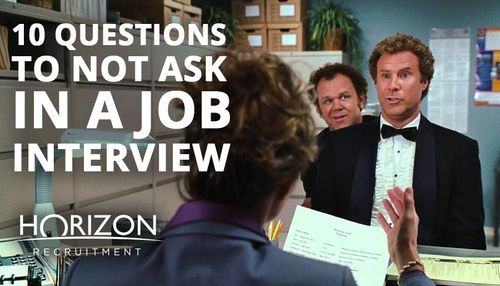Jason Saliani • March 31, 2016

Congrats on landing an interview for your dream job with a great employer!
So far the interview is going great, you’ve nailed every behavioral question they’ve thrown at you, you’ve explained why you’re the perfect fit and you have given a great answer for the tricky technical question they dished out. The interview is winding down and they ask if you have any questions for them.
From this point, things can go one of two ways, either you hit ‘em with a couple killer questions that impress and show you’ve been listening, or you unknowingly ask something that makes the interviewers second guess if you’re the right person for the job.
Following up on Bradley Clark’s great LinkedIn Pulse Post about questions you should ask, we thought we should do the same, but opposite…In no particular order, here are ten questions that you should definitely skip if want to land the job.
1. So, what do you guys do?
This is probably the most basic error anyone could make but believe me, it happens more often than you may think. Interviewers will expect that you’ve done your homework before sitting down with them. You should do your research on the company and on the people you’ll be meeting with before the interview, otherwise you just come across as unprepared. Google is a thing, you have no excuse. You should have a solid understanding of what the company does, what the position entails and even a background of the interviewers before sitting down with them. You want to come across as someone who is proactive and has invested some time into the process too. (Hint: A lot of interviewers ask, “What do you know about us” and “Why do you want to work here” to see what kind of research you have done.)
2. How in depth are your background checks?
“Um…Do you have something to hide? Is there a criminal record we should be aware of? Was that his white van parked out front?” These are a few of the questions that may be running through the interviewers heads when you ask this. Probably best to skip this one.

3. What other jobs are you currently looking to fill?
There isn’t anything wrong in being interested in different roles in an organization but this is definitely the wrong way to frame it. If you’re not interested in the role you’re interviewing for, why would you waste their time? Never agree to an interview for a job you don’t want just in the hopes of getting your foot in the door for other positions they might be hiring for. Asking this will be a major red flag to the interviewers that you’re not interested in the position and you’ll come across as indecisive.
4. Can I do this job from home?
While telecommuting and work from home options are becoming more and more frequent, asking this before you’ve been offered a job is poor form. Unless the job description specifically states this as an option, you should steer clear of this question because it risks coming across as wanting to work in your PJs from day one. After you’ve established yourself in a company and built up some goodwill, an employer would be much more likely to consider this type of thing if they don’t already. And if this is a perk that the company provides, they will surely bring it up themselves when they are woo-ing you with a job offer.

5. When do I start?
This certainly is a bold question! While it shows confidence in yourself, it may come across a little too audacious for many interviewers. If you mean to ask “When they are looking to have someone start”, or “When they’d like to have the position filled” then ask as such. Assuming that you are their preferred candidate and that you’ve locked up the job is…well you know what they say about people who “Assume…”
6. When can I take my first vacation? (What is your policy on leave of absences?)
If the first thing that you ask about is how quickly you can get out of there and hit the beach, then you’re probably not getting a job offer, let alone a second interview. This type of question really leads the interviewers to wonder how interested and serious you are about working with them. You want to show a company the value you can bring when your bum is in the seat working, and not how they will be paying you to tan by the pool while sipping margaritas.
7. What are your benefits like?
Again, if you seem more interested in how much of your dental bills will be covered and what the parental leave benefits look like rather than what sort of career growth potential there is within the company, that will raise some red flags. Of course, when it comes to the offer stage some of these questions might be more reasonable, but definitely not in a first or second interview. As a rule of thumb, any question that is policy driven rather than value driven is a no-go during the interview stage.

8. How quickly do people get promoted? (How quickly can I get a raise?)
What gets heard when you ask this is not ambition, but potential dissatisfaction in the role right away. They want to know that you’ll be happy and fulfilled in the position you’ve applied for and not looking for a promotion or a raise in a few months (or worse yet, looking at another role in another company!) There is an art to balancing your excitement for the position at hand and expressing your interest to move up in the future.
9. Are there any real challenging people to work with?
Another question that’s going to make the interviewers wonder about you. “Do you have difficulty getting along with others? Are you going to be a good fit here? Are you weirdly possessive with your pens?”
10. How did I do?
When the interviewers ask you if you have any questions at the end of the interview don’t ask them how you did! This shows a major lack of confidence and puts the interviewers in an awkward position at a time when you want to leave a positive impression. During an interview isn’t the time to get feedback on your interviewing skills. Come prepared with some questions that will show you were paying attention and demonstrate your interest in the company and role.
Question time is only one part of the interview, but it is your time to show interest in the role. Hopefully we’ve convinced you to steer clear of these interview landmines. But what might be even worse than asking one of these gems, is asking nothing at all!
When asked if you have any questions, hearing “No, I think I’m good…” comes across as disinterested and indifferent – not the way you want to finish an interview.
Make sure you have some thoughtful questions to demonstrate your interest and how awesome you are. If you need some help coming up with strong questions to round out your perfect interview, stay tuned for 10 Questions You Should Ask at the End of an Interview.
Share Blog
Latest Blogs



